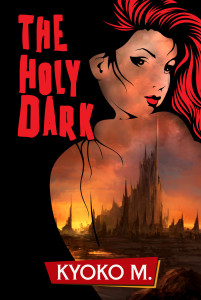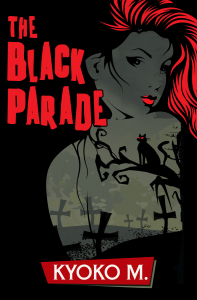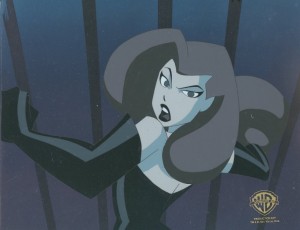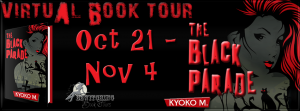So I finished the final installment to The Black Parade series a few days ago.
Hoo boy.
Prior to the third book, whose working title is The Holy Dark if you must know, I’ve written and finished three books–two novels and a novella. However, I’ve never written a series before and the first thing I have to say is, God bless the crazy sons of bitches who write long running series. I mean, seriously, The Black Parade series is just a trilogy, and I had the HARDEST time keeping everything in line. I think as authors we tend to take certain things for granted when we write. For instance, I didn’t realize just how long The Holy Dark was until I went through and began formatting it and doing the superficial edit.
The Holy Dark’s first draft is 168,197 words. Let’s do a comparison, shall we?
The Hobbit: 95,022 words
The Fellowship of the Ring: 177,227 words
Harry Potter and the Goblet of Fire: 190,637 words
Harry Potter and the Deathly Hallows: 198,227 words
Are you beginning to see my plight here? I’m nowhere near as good as the above authors, but my word count is approaching their glorious numbers and it’s slightly terrifying. However, when I researched word counts of famous novel series, I did notice a trend. They do increase in word count the longer on they continue, and I think it has a lot to do with the process of writing towards the end of a series.
As I wrote The Holy Dark, there were all kinds of things that I had to keep in mind to tie up by the conclusion of the novel. Jordan and Michael’s stories span three books, and several storylines intersect with each other. We also meet new characters in the second and third novels who also have their own lives and stories and backstories. It’s like balancing spinning plates after a certain point. The reason why The Holy Dark took me so long to write (I started it in May 2013 and finished it just after New Years) is because I didn’t fully understand what it takes to end a series. There’s so much material to cover. There are your individual character arcs, the romantic character growth between Jordan/Michael and Jordan/Belial, the series long arc of the battle between the Seers and the demons, the ramifications of what happened in the previous novels, and then the actual plot of the current novel. Does your head hurt yet? Mine certainly does.
Endings, to me, are usually a little easier than beginnings. The original beginning to The Black Parade was Jordan reliving the night she killed Mr. N, but two separate critique groups talked me out of it because action-heavy beginnings with no context tend to work better in movies than in novels. Thus, we had our quiet but tense opening with Jordan waking up and starting her day as a Seer. However, the ending to The Black Parade was pretty much set in my head in general terms. I knew where her character would end up. Same deal for She Who Fights Monsters. The Holy Dark’s ending was a vague concept in my head, but how I got there was nothing short of a doozy. This is the first novel I’ve ever written where the beginning was a lot easier than the ending.
For instance, the first draft of THD is actually the second draft. The first time I wrote it, I got to 50,000 words in about two months. Then I stopped, read it, and panicked because the pacing was dreadful. The plot stopped and started and coughed and wheezed and begged to be put out of its misery. Thus, I had a long chat with my writing sensei and he helped figure out why the novel had such horrendous pacing issues. I had so many scenes that I wanted to write before the series ended that the flow of the novel felt unnatural and stilted. I took everything back to the drawing board, deleted big chunks, altered the narrative, and started up again. I did well for several months and then the end of the year hit. I had so many hours at my retail day job that I missed my 2013 deadline because so much of the story had piled up that I didn’t have time to type it all out. My fingers just weren’t fast enough.
What I’ve learned over the course of writing this first draft is that endings can be difficult because one worries about satisfaction. Is the end of the series satisfying? Where does everyone end up after their three book long journey? What have they learned? What have they gone through? How has it changed them? Is the conflict real and personal? Is it something readers will relate to and cherish? There are so many expectations that consciously and unconsciously crop up when you read the final novel in a series.
For example, I’m not a fan of Mockingjay because it felt overstuffed and convoluted. I liked The Hunger Games the best out of the novels because it was succinct and profound. It also had much less of the Peeta/Katniss/Gale love triangle, which I personally find to be pointless. Katniss is not the kind of girl who needs to be torn over two boys. It’s quite clear that she has romantic feelings for Peeta, not Gale, and I worry that Suzanne Collins dragged the love triangle out for the sake of drama, and not because it needed to be there. Now, granted, I’m sure I will get the same criticism in the future because I’ve got my own love triangle going in my series, but I’m just being honest. Either way, The Hunger Games is still one of the best contemporary novel series of all time. I bring it up because my expectations for where the story would end up was way different from how it actually did. I don’t think that authors should pander to their audiences and fret over what they would enjoy reading, but I do think it’s part of the writing experience anyway. It’s what I struggled with during the epilogue of THD because I had scenes that I wanted to write that I felt the readers would enjoy, but since they weren’t plot relevant, I felt the urge to leave them out. After all, nothing gets people crankier than a too-sweet happy ending. I tend to lean towards bittersweet endings because they are more realistic. It’s the same reason why Harry Potter and the Deathly Hallows’ epilogue is so controversial–a lot of it reads like lousy fanfiction. Being too saccharine in your ending can color the whole series. Hell, my mother and I discussed this last night with the movie Sweet November. We actually liked the movie itself…until the ending. The ending blew it. It just blew. It was a dumb, unsatisfying cop out. That ending ruined the entire experience and cost the people who made it a sale (I found the movie for cheap at a game store and thought about buying it, but then I remember that FUBAR ending and chose not to instead). It’s the same with novels. You can write something beautiful and emotionally crippling, but if you screw up the ending, it can poison your entire series.
Now compact everything I’ve said and shove it inside your ear. That’s how my brain feels right now. Endings are a pain in the ass. This is a shout out to every single author who has ended a novel series: you are incredible and I hope you know that with all your heart. My stories aren’t nearly as complex as something like George R. R. Martin or J.K. Rowling, and they somehow have endings. I will absorb these authors’ wisdom into my own body like an amoeba before I start the first round of editing.
The nice thing about being an author is that you can always change. You can move chapters around. You can delete them. You can expand. You can chase down new plot threads and character arcs and nail them into place. As a wise Autobot once said, freedom is the right of all sentient beings, and I think that is most true with writing. The Holy Dark kicked my skinny ass up and down the year 2013, but it taught me more than I think the first two novels combined. It’s scary to think I won’t be writing about Jordan, Michael, Gabriel, and Belial in the future, but these characters have been beyond fun to write over the past five years. I think that’s also why the ending was so difficult. I wanted to put them to rest with all the respect that I could because they’ve been keeping me company for so long. I suppose that’s sentimental (and borderline clinically insane), but hey, that’s how I roll.
Welcome to 2014, people. Big things are in our future. Stay tuned for more.
-Kyoko



